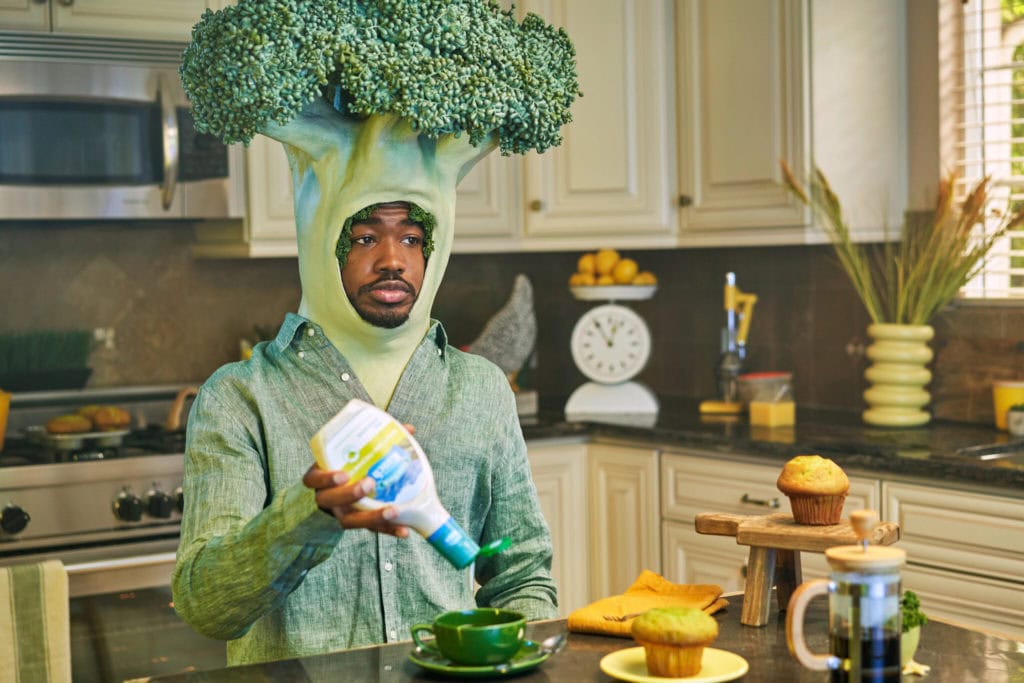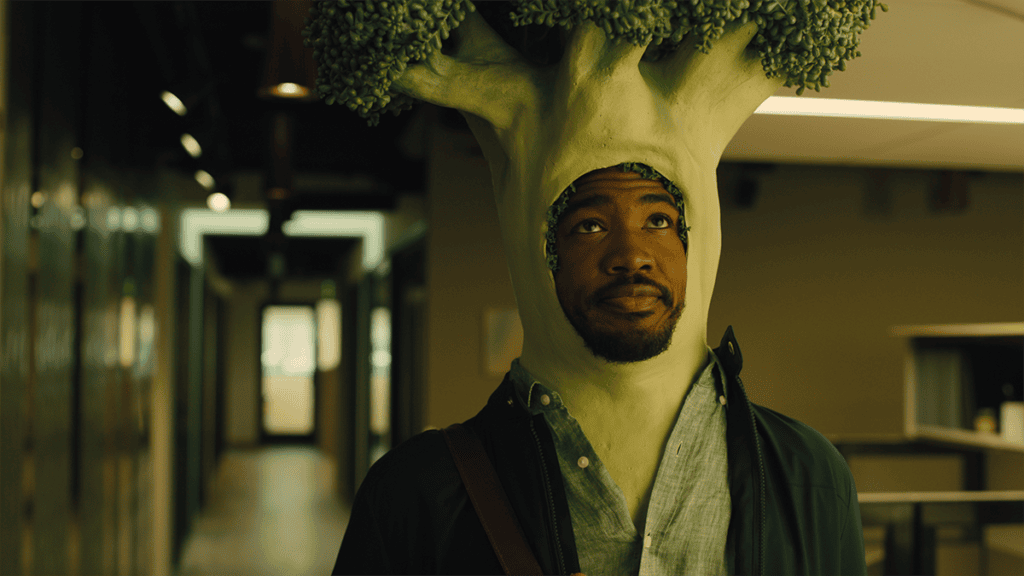Why is weed restricted in marketing? Weedmaps asks the question in a new commercial that explores the unhelpful ways media platforms stifle conversations about cannabis and keep information from consumers.
With medical use of cannabis now legal in 37 states and recreational use legal in 18 states, we should be seeing commercials touting companies, products, and services just about as often as there are ads for sports betting, which is live and legal in some capacity in 30 states.
Yet mainstream cannabis advertising is essentially nowhere to be found.
Why is that?
That’s the central question posed by Weedmaps in a new digital commercial spot timed to the Super Bowl, one that addresses advertising restrictions and social media bans imposed on legal cannabis businesses for marketing their products and services. The ad features an office worker named Brock Ollie, whose head resembles a head of broccoli, who goes about his day having far-from-subtle references thrown at him as a stand-in for cannabis. At the end of the day, he hangs out with his friends, Pot and Leaf, who know his constant struggle far too well.
“Despite three quarters of the country having legalized cannabis and the bipartisan enthusiasm we continue to see in support for change at the federal level, the industry continues to face roadblocks that inhibit competition in the legal market and stifle opportunities to educate,” said Chris Beals, Weedmaps’ CEO. “There’s an irony in the fact that the biggest night for advertising will feature an array of consumer brands in regulated industries, from beverage alcohol to sports betting, yet legal cannabis retailers, brands, and businesses have been boxed out.”
The legal, regulatory, and business landscapes of the cannabis industry are in a constant state of flux, and advertising is no different. What’s permitted often changes on a federal, state and local level, with companies always having to keep up on what’s allowed and what they can’t do. Some of these restrictions include; censorship on social media platforms; where paid ads can be placed; and stringencies on where outdoor billboards can be placed, including requiring approval from the building owner, according to Rebecca Larzik, Weedmaps’ director of brand marketing.
“In order to overcome some of these challenges, brands often use things like the broccoli emoji as a visual representation of cannabis in their marketing materials, as the actual plant is deemed inappropriate to showcase,” she said.
Arend Richard, the co-founder and creative director of cannabis video and social platform WeedTube, said the advertising and marketing space is at the same time unregulated and over-policed. The majority of social media platforms have vague guidelines for cannabis-related content, enabling them to remove and censor content whenever they want.
Richard was previously a YouTube content creator who educated people about cannabis, growing his channel to 190,000 subscribers. YouTube shut his channel down without warning, he said, which caused him to start WeedTube, a social platform specifically for the cannabis community, with who he calls other deleted creators. Its Instagram account had more than 200,000 followers, but has been deleted multiple times, he said, and remains deactivated right now.
“Our team never shared any content on that profile that violated Instagram’s cannabis policies,” Richard said, “and we’ve been unable to get a response from them on how we can operate differently to appease them.”
Weedmaps’ Instagram account was deactivated on Dec. 16, 2021 due to “violating terms,” though the company said it didn’t get further details or an explanation from the social media platform. The WM account was also “shadow-banned” for many years, including the banning of the #weedmaps hashtag on IG.
This seemingly arbitrary restriction in advertising and social media was the overarching idea for Weedmaps’ Brock Ollie ad, as were these roadblocks placed in the way of companies and the consumers they served to get reliable information to make purchasing decisions while further removing the stigma people still have when it comes to cannabis.
“Our mission to power a transparent and inclusive global cannabis economy is hindered by the many restrictions on the channels of communication available to us, and limitations around the information we can share with the public,” Larzik said.
To try and not only avoid WeedTube’s fate but also highlight the restrictions and censorship placed on cannabis brand, Weedmaps used the very safe (and admittedly unsubtle) broccoli stand-in.
“We thought it would be a fun approach to a serious topic if we looked at the censorship we are encountering through broccoli’s eyes,” Larzik said. “The idea of personifying broccoli and having its likeness borrowed by the cannabis industry struck a chord in our writers room.”
Richard has shifted many of his marketing efforts and strategy highlighting the censorship issues the industry faces and trying to get social media brands to provide a level playing field.
“If Instagram and YouTube were removing canna content across the board like TikTok, it wouldn’t be such an issue,” he said. “The fact that they let other accounts in the industry thrive without so much as a shadow ban shows that they are still giving opportunity to some and not to others. This is problematic on a whole other level when considering the importance of equal opportunity for small businesses in a growing industry.”
For cannabis companies to get the most out of marketing and promoting their brands, social media platforms need to make their cannabis brand policies clearer and more consistent so that businesses can follow uniform guidelines and learn from and correct their mistakes, Richard said.
For Weedmaps, pushing creative and experiential ads and brand initiatives like this one will help further legal and cultural acceptance of cannabis that will ultimately bring safe and legal access to the plant.
As Brock Ollie said in the commercial, “cannabis is here. It’s time we talk about it.”

